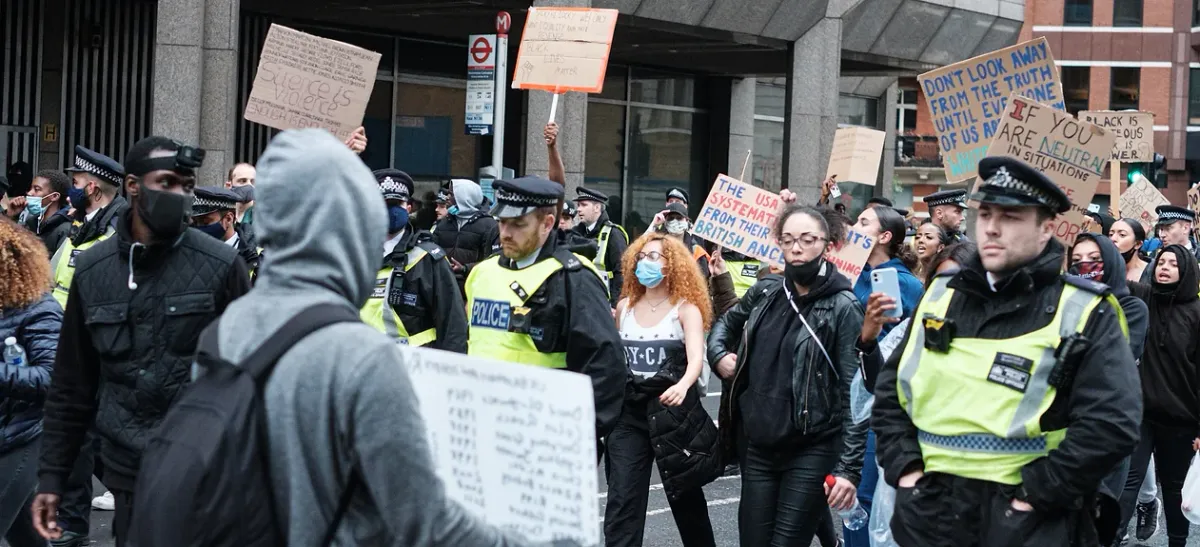The UK Needs Its Current Prison Abolition Movement If It Wants to Keep Us Safe
Powered by Black people, other racialised groups and campaign groups for decades, the police and prison abolition movements are finally getting mainstream recognition in the UK, and the system transformation they suggest is just what this country needs

Access the Audio Read version of this article directly on Spotify for Podcasters.
TW: Mentions of sexual assault, murder
Discrimination experienced by young Black men from the police has been ignored by the general public for years, and it only got worse during the pandemic. During the first UK lockdown in 2020, the Metropolitan Police stopped young Black men nearly 22,000 times – the equivalent of more than a quarter of all Black 15-24 year olds in the capital, according to a study in the Guardian last year.
As Dr Waqas Tufail, Senior Lecturer in Criminology at Leeds Beckett University, explains, “the current crisis in policing – covering racism, misogyny and corruption – is a reality all too familiar with activists and those that have been harmed by such conduct.”
I talked to Jamal*, a Black Londonner in his mid-twenties, who shared his experience of police brutality and institutional racism: “They are not following procedures, and I don’t know why more people aren’t shouting about it, to be honest.” But in light of recent events, including last year’s Black Lives Matter marches, the continuation of the Police, Crime, Sentencing & Courts bill through Parliament and the sickening behaviour of the police while dealing with the case of Bibaa Henry and Nicole Smallman’s murders, the UK abolition movement has finally appeared to gain momentum.
Both police and prison abolition push for more than reform and argue for oppressive structures to be dismantled. “There has been a discernible shift in public perception towards policing as of late, but this cannot simply translate into empty reforms,” says Dr. Tufail.
Community Action on Prison Expansion (CAPE) is an abolitionist organisation, targeting the government’s projects in prison expansion across Britain. An anonymous spokesperson for CAPE detailed a rise in police funding and prison expansion in recent years as investments into ‘infrastructures of torture’. On the topic of abolition, the source divulged that the question most people asked them was ‘what will happen to rapists if prisons are abolished’?
Their response is that the criminal justice system doesn’t properly solve the problem of sexual assaults - a point once more highlighted by the murder of Sarah Everard by PC Wayne Couzens this year, and the countless stories that have since been released about domestic violence and the high levels of misogyny in the UK as a whole, including stories of police harassment and sexual assault.
“Let’s think of a way we can tackle and address these issues - transform into a society where that [sexual assault] won’t happen and keep survivors safe in the process,” says the same anonymous spokesperson for CAPE. “Abolition is not abolishing a functioning system, it’s abolishing a failing system and actually investing in creating systems that do work and keep us and our community safe”.
This need for a holistic, community-led approach alludes to the concept of transformative justice, supported by many in the abolitionist movement. This political framework and approach seek to respond to violence, harm, and abuse without creating more violence, engaging in harm reduction to lessen the violence.
SOAS Detainee Support (SDS) is a grassroots abolitionist visiting group in the UK, that works in solidarity with those detained by the State and applies the idea of transformative justice in its own practice. Kechi, a coordinator at SDS, detailed the group’s approach to this concept as a process, which includes unlearning the focus on punishment for a detainee who has committed what society deems a crime and extending solidarity and support to them. “People aren’t disposable, we can’t just write them off, even if the thing that they have done itself goes against our principles and values” she says. “It's also about not relegating them to that space of social death where we put people in prison and they kind of suffer through the isolation, with the dehumanisation of that experience tricking us into thinking that’s in any way going to fix the social ills at the heart of whatever caused them to do ‘wrong’ in the first place”.
Although the term ‘transformative justice’ can mean different things to different people, its involvement in society and public safety ventures further than abolishing the police and prisons.
Abolition and transformative justice can often suggest a need for system change, with a need for fixing problems such as those within the education system and health system.
Jamal describes how his teachers, police officers and other authority figures have talked down to him and treated him with disdain, over and over again, throughout his life, an attitude stemming from their problematic views and sense of superiority. “I’ve been harshly disciplined for everything that I have ever done in my life, for as long as I can remember”.
The criminalisation and marginalisation of specific demographics are not limited to the criminal justice system, exemplified by the school exclusion to prison pipeline, and the involvement of the public, including Nurseries and medical staff, in the Government’s Prevent programme. Kechi believes that the criminal justice, education, and health systems are indeed interlinked and support each other, sharing that she is in favour of uprooting the current system as we know it.
“There is a need for radical, to-the-root change if you’re going to dismantle them all,” she says. “That doesn’t mean that every single organisation has to be focused on every single area or discipline - that’s not possible - but it does mean that we need to be collaborating with one another.”
* Name has been changed on request





